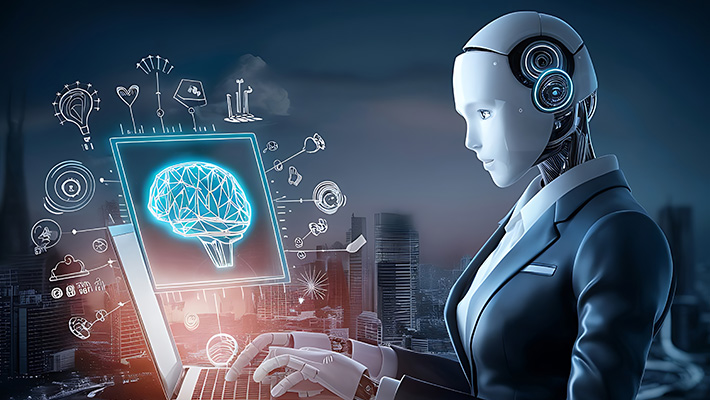
The way Artificial Intelligence has developed in the past few decades and now become a part of everyone's life. It has grown from being on smartphones to smart home devices, affecting almost everything in our world today. The following text discusses how AI has impacted daily life and considers the future consequences.
AI's Subtle Integration into Our Everyday Lives
As we progress in the 21st century, artificial intelligence has just become a part of our lives discreetly. From virtual assistants to suggestions of related products, its presence can be felt everywhere. And the discreet nature of this integration goes unnoticed most of the time as AI operates discreetly in the background and influences action without the limelight. An understanding of such a life must be paired with a comprehension of the manner in which AI is today an omnipresent yet unassuming force in our existence.
The 10 Impacts of AI in Our Daily Lives
1. Enhanced Convenience
AI has simplified daily tasks, making life more convenient. Voice assistants like Siri, Alexa, and Google Assistant help with reminders, schedules, and smart devices. AI in mobile apps provides quick access to information, weather, directions, and food ordering, saving time and boosting efficiency.
“Artificial intelligence will have a more profound impact on humanity than fire, electricity and the internet.” – Sundar Pichai
2. Personalized Experiences
AI has transformed content consumption by personalizing experiences. Services like Netflix, YouTube, and Spotify use user data to recommend shows, movies, and music, improving over time for more accurate suggestions. AI also recommends products during online shopping based on browsing history, enhancing the user experience.
“AI is something that is risky at the civilization level, not merely at the individual risk level, and that’s why it really demands a lot of safety research.” – Elon Musk
3. Improved Healthcare
AI has revolutionized healthcare through improving diagnostics, treatments, and patient care. AI analyzes medical data for patterns, allowing earlier intervention, such as identifying early signs of diseases like cancer. AI-supported surgery increases precision, with reduced human error. Genetic information helps in the development of personalized treatments, which increasingly provide tailored care. This improves results and decreases costs for healthcare.
"The rise of powerful Al will be either the best or the worst thing that has ever happened to humanity." – Stephen Hawking
4. Autonomous Transportation
AI empowers autonomous vehicles and drones, as well as the use of autonomous trucks to transform transportation. These vehicles are expected to operate on the road, sense obstacles, and make on-the-spot decisions about safe passage, thus reducing accidents, improving traffic flow, and enhancing time efficiency. AI further helps beg transportation for the elderly, disabled, or non-drivers to make them mobile and independent.
“The world is now starting to embrace artificial intelligence. This could lead to a new era of human progress.” – Geoffrey Hinton
5. Better Customer Service
AI is rapidly changing the way customer service is operating with virtual assistants and chatbots who utilize natural language processing to reliably answer questions. Available around the clock, AI tackles tasks from basic inquiries to complicated dilemmas while enhancing personal touch and speeding response times, decreasing wait times and increasing customer satisfaction.
"Some people call this artificial intelligence, but the reality is this technology will enhance us. So instead of artificial intelligence, I think we'll augment our intelligence." – Ginni Rometty
6. Smart Home Automation
The AI smart home transformation walks hand in hand with comfort, convenience, and energy efficiency. Appliances from thermostats to lights and security cameras learn patterns for energy conservation and security enhancement. AI appliances track usage, optimize for performance, and notify users for maintenance, all lending to a seamless experience.
“The development of AI may be the most important event in the history of our civilization, but it could also be the last.” – Nick Bostrom
7. Improved Shopping Experiences
AI has transformed retail by improving both online and in-store shopping. It analyzes customer data to predict behavior, identify trends, and optimize inventory. Online retailers use AI for personalized recommendations, while virtual fitting rooms boost confidence. In stores, AI robots assist with restocking and guiding customers, enhancing efficiency.
“Like all technologies before it, artificial intelligence will reflect the values of its creators. So inclusivity matters - from who designs it to who sits on the company boards and which ethical perspectives are included.” – Kate Crawford
8. Increased Productivity in the Workplace
AI makes the workplace more productive by automating tedious tasks and leaving employees free to focus on strategic matters. By providing tools such as AI project-management software and scheduling assistants, operations become simple, while AI data analytics assist in effective decision-making. This boosts productivity, cuts costs, and enriches employee involvement.
"We must ensure AI is used responsibly to augment human ability rather than replace it." – Sheryl Sandberg
9. Enhanced Security
AI improves security by detecting suspicious behavior in surveillance, using facial recognition for identification in public spaces, and monitoring financial transactions for fraud. It also predicts cybersecurity threats and protects personal data, enhancing digital safety.
"Before we work on artificial intelligence, why don't we do something about natural stupidity?" – Steve Polyak
10. AI in Education
AI personalizes learning by adjusting content difficulty and providing instant feedback. It also helps with grading and scheduling, allowing teachers to focus more on instruction and creating a more efficient learning environment.
“Artificial intelligence is the future but we must ensure it is a future that we want.” – Tim Cook
What opportunities can we anticipate from AI in the future?
In times to come, AI is foreshadowed to set the ground for vast opportunities across sectors. Within the healthcare industry, AI could come into play in advanced diagnostics, precision medicine, and automated surgeries. By means of AI, education will be transformed in that it will personalize education whereby students will be able to move at their own pace. AI-powered automation will drive the productivity of industries such as manufacturing, transportation, and logistics, in addition to contributing to their sustainability efforts. Apart from improving cybersecurity, AI will trigger autonomous transportation systems and create breakthroughs in areas such as quantum computing and natural language processing with the resulting reshaping of the world workforce and economy.
Ethical Considerations and Challenges
The rapid advancement of AI technologies poses ethical dilemmas with a special focus on privacy and use of data. AI systems particularly make dependence on personal data, thus raising concerns on how data has been collected, stored, and accessed. Another worry bugging individuals is that AI systems can replicate biases in hiring, law enforcement, and lending outcomes. Ensuring accountable and transparent uses of AI is paramount, and various efforts are on the way to produce regulations and guidelines concerning ethics that would benefit society in general.
Conclusion
AI has begun changing various aspects of daily life, improving conveniences and transforming areas like health services and transport. As much as benefits may bring clear benefits, the ethical challenges that arise are fairness, privacy, and even accountability. The evolution of AI will unleash an unprecedented new world of possibilities.







